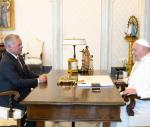You are here
OPEC official expects oil price to rebound further this year
By Agencies - May 18,2015 - Last updated at May 18,2015
KUWAIT CITY — Oil prices could continue to rebound in the second half of 2015 following signs of growth in demand and a drop in high-cost production, an Organisation of Petroleum Exporting Countries (OPEC) official said Monday.
"It is expected that a kind of a balance will exist in the oil market in the second half of 2015 which will support prices," Kuwait's governor at OPEC, Nawal Al Fuzai, told reporters.
"Prices are improving, growth in supplies from outside OPEC, especially shale oil, is lower than before and demand is recovering," she said.
This has pushed both OPEC and the International Energy Agency (IEA) to adjust upward their forecasts for crude demand, Fuzai added.
She remarked that it was too early to predict any decision by OPEC at its meeting next month.
The 12-member group decided in November not to cut output, a decision that saw crude prices dive 60 per cent before starting to rebound.
Over the past few weeks, oil prices have climbed about 40 per cent but remain well below their levels of more than $100 a barrel in June last year.
The aim of OPEC's decision was to curtail the fast-growing shale oil sector in the United States.
Fuzai said that she does not see oil prices dropping this year barring any major events, such as a sudden and unexpected slide in demand.
But she warned that an expected deal between Iran, a member of OPEC, and Western powers over the Islamic republic's nuclear programme could heap added pressure on oil prices even though Tehran is not likely to resume exports soon.
Fuzai said surplus supplies of crude oil on the market dropped from around 2 million barrels per day (bpd) late last year to between 1-1.2 million now.
She added that a meeting of technical experts from OPEC and non-OPEC conventional producers was held this month but no decision was taken.
Analysts say, however, that any gains in oil prices are being capped by continued concerns over a global oversupply in the face of weaker demand.
Separately, a senior Iranian official said on Monday that OPEC is unlikely to implement a production cut at its next meeting in June.
Asked if OPEC would cut output at the upcoming June 5 meeting, Iran's Deputy Oil Minister Rokneddin Javadi told Reuters: "I don't think so."
Iran, along with Venezuela, has repeatedly called for OPEC to cut output to shore up low prices that have eaten into producers' oil revenues.
Javadi's comments signal an admission that the group was unlikely to agree to a reduction, especially after its current strategy has succeeded in curbing non-OPEC output and allowed OPEC to regain market share.
OPEC, led by oil kingpin Saudi Arabia, decided at a meeting in November to maintain output and keep global markets amply supplied so that low prices would force high-cost US shale oil producers to cut production first.
Javadi indicated later that Iran is still likely in June to push for output reduction or cooperation on the right amount of oil to be delivered to the market.
The meeting could "reinforce cooperation between the members because OPEC is an organisation that could make policies for oil price orientation," Javadi told reporters on the sidelines of the Asian Oil and Gas conference in Kuala Lumpur.
Export levels after sanctions lifted
Iran hopes its crude oil exports will return to pre-sanctions levels within three months once a deal with major powers to lift an oil embargo is finalised, he said.
"We hope we can come back to the export levels that we had before the sanctions," Javadi, who is also the managing director of the National Iranian Oil Company, told Reuters.
"Yes, 2.5 (million barrels per day), around," he said, adding that this could possibly be achieved in three to six months.
A recent framework deal on Iran's disputed nuclear programme between Tehran and world powers could see sanctions on Iran eventually lifted if a more permanent pact is finalised by a June deadline.
The sanctions have more than halved Iranian oil exports since 2012 to about one million bpd, mainly to Asia.
Iran currently has less than 10 million barrels of crude stored onboard tankers that could be released post-sanctions depending on market conditions, Javadi said.
He remarked that the OPEC producer expected to claw back lost market share in Asia and Europe.
"It depends on market situation and price level, but we will come back to the traditional trade that we had before," he said, adding that Asia could take more than 50 per cent of Iran's exports.
Discussions on OPEC making room for the return of Iranian oil would depend on whether sanctions were lifted, he said.
Iran says that an increase of its oil production will not cause a price crash. It expects other OPEC members to make way for extra barrels, but so far there is no sign that other OPEC members are willing to cut supply.
Iran plans to hold a conference in London in September to attract investors for its exploration and production sector, Javadi said.
Javadi said he expected the oil price to rise to around $80 a barrel by the end of 2016.
"From a commercial point of view, today's prices should be sustained and increase gradually," he indicated on the sidelines of the Asia Oil and Gas Conference in Kuala Lumpur. "But it depends on the political situation and what's going on in the Middle East and Arabian countries."
Related Articles
VIENNA — Members of the Organisation of Petroleum Exporting Countries (OPEC) failed to agree an oil production ceiling on Friday at a meetin
LONDON — The Organisation of the Petroleum Exporting Countries (OPEC) on Monday predicted global demand for its crude oil will be less than
VIENNA — A recent announcement by the Organisation of Petroleum Exporting Countries (OPEC) that it is keeping crude output levels unchanged
















